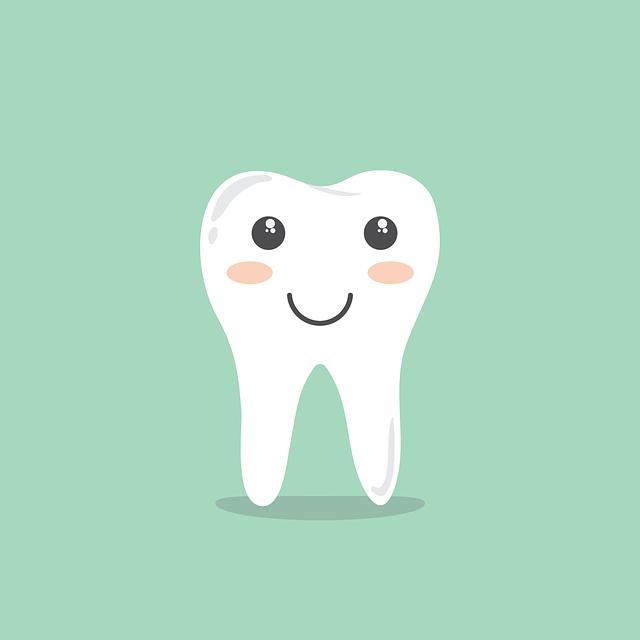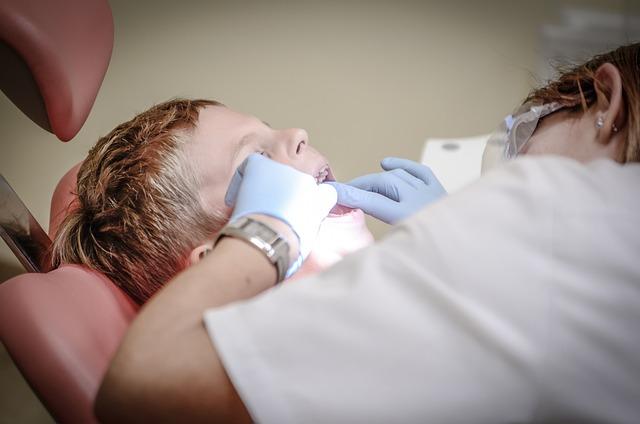Does Salt Clean Your Teeth? Dental Truths Revealed
Are you tired of the age-old debate about whether salt actually cleans your teeth? Well, buckle up because we’re about to reveal the dental truths that will put this question to rest once and for all. In this article, we’ll dive deep into the scientific facts and expert opinions to uncover the real story behind salt’s impact on your pearly whites. So, grab your toothbrush and get ready to explore the fascinating world of dental care where confident knowledge meets neutral clarity.
1. Unveiling the Truth: Can Salt Really Clean Your Teeth?
Many people have turned to natural remedies for their dental care, and one popular option is using salt to clean teeth. But can salt really clean your teeth effectively? Let’s dive into the truth behind this age-old practice.
First and foremost, salt has been used for centuries as a natural antiseptic and cleansing agent. Its abrasive nature can help remove plaque and stains from the surface of the teeth, leaving them feeling cleaner and looking brighter. Additionally, salt has antibacterial properties that can help fight against harmful bacteria in the mouth, reducing the risk of gum disease and tooth decay.
However, it’s important to note that while salt can provide some oral hygiene benefits, it is not a substitute for regular brushing and flossing. Salt cannot remove the sticky plaque that forms between teeth and along the gumline, which can only be effectively removed by mechanical action. Therefore, incorporating salt into your oral care routine can be a beneficial supplement, but it should not replace traditional dental hygiene practices.
- Benefits of using salt to clean teeth:
- Removes plaque and stains from the teeth
- Has antibacterial properties that promote oral health
- Cost-effective and easily accessible
- Limitations of using salt to clean teeth:
- Cannot remove plaque between teeth and along the gumline
- May cause sensitivity or irritation in some individuals
- Not a substitute for regular brushing and flossing
In conclusion, while salt can provide some benefits for oral hygiene, it should be used as a supplement to regular brushing and flossing rather than a replacement. If you’re considering incorporating salt into your dental care routine, it’s always best to consult with your dentist to ensure it is suitable for your specific needs.

2. Separating Fact from Fiction: The Dental Reality of Salt as a Cleaning Agent
When it comes to dental care, separating fact from fiction is crucial. One popular belief is that salt can be used as a cleaning agent for teeth. However, it’s important to understand the reality behind this claim.
The truth about using salt as a cleaning agent for teeth:
- Salt can act as a mild abrasive: Salt has a gritty texture that can help remove some surface stains on teeth. However, it’s important to note that salt alone cannot effectively remove deep stains or plaque buildup.
- Salt has antibacterial properties: Salt has been used for centuries as a natural disinfectant. Rinsing with a saltwater solution can help kill bacteria in the mouth, promoting oral hygiene. However, it should not replace regular brushing and flossing.
- Overuse of salt can be harmful: While salt can have some benefits for oral health, excessive use can be harmful. Saltwater rinses should be used in moderation to avoid dryness or irritation of the oral tissues.
While salt can have some positive effects on oral health, it is important to remember that it is not a substitute for regular dental care. Brushing twice a day, flossing daily, and visiting your dentist regularly are still the best ways to maintain a healthy smile.

3. Understanding the Science: How Salt Interacts with Your Teeth
When it comes to understanding the science behind salt and its interaction with your teeth, there are a few key factors to consider. Here’s a breakdown of how salt affects your dental health:
1. Saliva production: Salt has the ability to stimulate saliva production in your mouth. Saliva plays a crucial role in maintaining oral health by neutralizing acids and washing away food particles and bacteria that can lead to tooth decay and gum disease.
2. Oral pH balance: Salt can help maintain a healthy pH balance in your mouth. A balanced pH level is essential for preventing the growth of harmful bacteria that thrive in an acidic environment and contribute to dental problems. By promoting a neutral pH, salt can help create an environment that is less favorable for bacterial growth.
3. Antibacterial properties: Salt possesses natural antibacterial properties, which can help reduce the number of bacteria in your mouth. This can be particularly beneficial for individuals with gum disease or those prone to dental infections. Regular use of saltwater rinses or salt-based oral care products may help control bacterial growth and promote healthier teeth and gums.
Understanding how salt interacts with your teeth provides valuable insights into the potential benefits it can offer for maintaining oral health. Incorporating salt into your oral care routine, under the guidance of your dentist, can be a natural and effective way to support a healthy smile.
4. The Role of Salt in Dental Hygiene: Debunking Common Myths
In this section, we will explore the role of salt in dental hygiene and debunk some common myths associated with it.
1. Saltwater rinses:
- Using a saltwater rinse is a popular home remedy for oral health issues such as gum infections and mouth sores.
- Research shows that saltwater rinses can provide temporary relief by reducing inflammation and killing bacteria in the mouth.
- However, it is important to note that saltwater rinses should not replace regular brushing and flossing. They can be used as a supplementary measure to maintain oral hygiene.
2. Salt as a tooth whitener:
- There is a common belief that rubbing salt on teeth can help whiten them.
- While salt may have abrasive properties, it is not recommended to use it as a tooth whitener.
- Using abrasive substances like salt can damage the tooth enamel and lead to tooth sensitivity and other dental problems. It is best to consult a dentist for safe and effective tooth whitening options.
3. Salt as a remedy for tooth decay:
- Some people believe that salt can cure tooth decay or prevent cavities.
- Although salt can have antibacterial properties, it is not a substitute for professional dental care.
- Preventing tooth decay requires a combination of proper oral hygiene practices, regular dental check-ups, and a balanced diet low in sugary foods and drinks. Salt alone cannot prevent or treat tooth decay.
By understanding the facts and debunking these common myths, we can make informed decisions about our dental hygiene and ensure we follow the best practices for maintaining a healthy smile.
5. Exploring the Benefits: Is Salt an Effective Tool for Oral Health?
When it comes to oral health, salt has been praised for its potential benefits. While it should not replace regular oral hygiene practices, such as brushing and flossing, incorporating salt into your oral care routine may offer some advantages. Here are a few ways in which salt can be an effective tool for maintaining oral health:
- Relieves gum pain: Saltwater rinses can help alleviate gum pain and inflammation. The salt acts as an antiseptic, reducing bacteria and soothing discomfort.
- Reduces bad breath: Salt has antimicrobial properties that can help combat the bacteria responsible for bad breath. Gargling with saltwater can freshen your breath and leave your mouth feeling clean.
- Aids in healing: Saltwater rinses can promote healing after oral surgery or tooth extraction. The saline solution helps cleanse the area, reduce swelling, and promote faster healing.
While salt can be beneficial for oral health, it’s important to use it in moderation and follow proper guidelines. Excessive use of salt or using it in high concentrations can have negative effects on your oral health. Consult with your dentist or healthcare professional to determine the best way to incorporate salt into your oral care routine.
6. The Downside of Salt: Potential Risks and Side Effects on Tooth Health
Salt is a common ingredient used in cooking and food preparation, but it’s important to be aware of the potential risks and side effects it can have on tooth health. Here are some important points to consider:
- Increased risk of tooth decay: Consuming excessive amounts of salt can contribute to tooth decay. This is because salt can increase the acidity in the mouth, which can erode tooth enamel and lead to cavities.
- Higher blood pressure: Excessive salt intake is known to elevate blood pressure, which can have negative effects on overall health, including gum disease. High blood pressure can affect the blood vessels in the gums, making them more susceptible to infection and inflammation.
- Dehydration and dry mouth: Salt has a dehydrating effect on the body, and when combined with inadequate water intake, it can lead to dry mouth. This condition reduces saliva production, which is essential for maintaining oral health and protecting teeth from harmful bacteria.
It’s vital to moderate salt consumption and maintain a balanced diet to ensure good oral health. Remember to brush and floss regularly, visit your dentist for routine check-ups, and consult with a healthcare professional for personalized advice.
7. Expert Insights: What Dentists Say about Salt and Its Impact on Teeth
When it comes to the effect of salt on teeth, dentists have varying opinions. While some believe that excessive salt consumption can pose risks to dental health, others argue that moderate salt intake is generally safe. Here are some key insights from dental professionals:
- Salt and tooth sensitivity: Many dentists agree that salt can exacerbate tooth sensitivity in individuals with pre-existing dental conditions. The abrasive nature of salt crystals can irritate the gums and enamel, leading to increased sensitivity.
- Gum health and salt: Some dentists suggest that excessive salt intake can contribute to gum inflammation and periodontal disease. They emphasize the importance of maintaining a balanced diet and practicing proper oral hygiene to minimize these risks.
- Saliva and salt: Saliva plays a crucial role in neutralizing acids and maintaining oral health. While salt consumption can temporarily increase saliva production, excessive intake may disrupt the natural pH balance in the mouth, potentially promoting tooth decay.
Overall, it is recommended to consume salt in moderation and maintain good oral hygiene practices. If you have concerns about the impact of salt on your teeth or gums, consulting with your dentist is the best course of action.
8. Salt vs. Toothpaste: Comparing the Efficacy of Dental Cleaning Agents
When it comes to dental cleaning agents, two common options that people often consider are salt and toothpaste. While both options have their benefits, it is important to compare the efficacy of these agents to determine which one is more effective in maintaining oral hygiene.
Here, we present a detailed comparison of salt and toothpaste:
- Ingredients: Salt is a natural mineral composed of sodium chloride, whereas toothpaste contains a variety of ingredients such as fluoride, abrasives, humectants, and flavorings.
- Cleaning Action: Toothpaste, due to its specific composition, provides a mechanical and chemical cleaning action. The abrasive particles in toothpaste help remove plaque and stains from the teeth, while the fluoride strengthens the enamel. On the other hand, salt can act as a mild abrasive and help eliminate bacteria, but it lacks the additional benefits offered by toothpaste.
- Effectiveness: Toothpaste, with its comprehensive cleaning action, is generally considered more effective in removing plaque, preventing cavities, and maintaining overall oral health. The fluoride content in toothpaste also helps in remineralizing the teeth, making them more resistant to decay. Salt, while it can have some antibacterial properties, does not offer the same level of protection.
In conclusion, while salt can provide some benefits as a dental cleaning agent, toothpaste is generally more effective and recommended by dental professionals. Its proven cleaning action and additional benefits make it an essential part of a proper oral hygiene routine.
9. Safe Alternatives: Discovering Other Natural Methods for Teeth Cleaning
When it comes to teeth cleaning, there are safe and natural alternatives that can be just as effective as traditional methods. Here are some natural methods you can try:
- Baking Soda: This common household ingredient can help remove plaque and stains from your teeth. Simply mix a small amount of baking soda with water to create a paste, then brush your teeth with it for a couple of minutes. Rinse thoroughly afterwards.
- Oil Pulling: This ancient practice involves swishing oil around in your mouth to remove bacteria and improve oral health. Coconut oil is a popular choice for oil pulling. Swish a tablespoon of coconut oil in your mouth for about 15 minutes, then spit it out and rinse well.
- Apple Cider Vinegar: Although acidic, apple cider vinegar can help whiten teeth and kill bacteria. Dilute it with water, then swish it around your mouth for a few minutes and rinse thoroughly.
Remember, while these natural methods can be effective, they should not replace regular brushing and flossing. It’s always a good idea to consult your dentist before trying any new teeth cleaning methods to ensure they are suitable for your specific dental needs.
10. Making Informed Choices: Decoding the Truth about Salt’s Role in Oral Care
Salt has long been a topic of discussion when it comes to oral care. But what is the truth behind its role? Let’s decode the facts and separate them from the myths. Here are some key points to consider when making informed choices about salt and its impact on your oral health.
- Salt as a natural antibacterial agent: Salt has been used for centuries as a natural remedy for oral hygiene. It possesses antibacterial properties that can help reduce harmful bacteria in the mouth, preventing tooth decay and gum diseases.
- Saltwater rinses for oral health: Rinsing your mouth with a saltwater solution can be an effective way to promote oral health. It can help soothe sore gums, reduce inflammation, and speed up the healing process after dental procedures.
- Don’t overdo it: While salt can be beneficial for oral care, it’s important to use it in moderation. Excessive salt consumption can lead to dehydration, high blood pressure, and other health issues. Always consult with your dentist or healthcare professional for personalized advice.
Understanding the truth about salt’s role in oral care empowers you to make informed choices for your dental health. Incorporating salt as a part of your oral hygiene routine, with appropriate guidance, can help you maintain a healthy and radiant smile.
Frequently Asked Questions
Q: Does salt clean your teeth?
A: Yes, salt has cleansing properties that can help maintain oral hygiene.
Q: How does salt clean teeth?
A: Salt acts as a natural abrasive that can help remove plaque and stains from the teeth when used in moderation.
Q: Is salt a substitute for toothpaste?
A: While salt can be used as a temporary substitute for toothpaste in certain situations, it is not a complete replacement. Regular toothpaste contains additional ingredients that are essential for maintaining optimal oral health.
Q: Can salt prevent cavities?
A: Salt alone cannot prevent cavities entirely. However, it can contribute to oral health by reducing harmful bacteria in the mouth and promoting a clean environment.
Q: Are there any risks associated with using salt as a dental cleanser?
A: When used excessively or in high concentrations, salt can potentially damage tooth enamel due to its abrasive nature. It is important to use salt sparingly and in combination with other oral care practices.
Q: How often should salt be used for dental cleaning?
A: Salt can be used as a dental cleanser occasionally, but it should not replace regular brushing and flossing. It is best to consult with a dentist to determine the appropriate frequency for incorporating salt into your oral care routine.
Q: Can salt help with gum disease?
A: Saltwater rinses can provide temporary relief for gum inflammation and pain associated with gum disease. However, it is crucial to consult a dentist for proper treatment of gum disease to prevent further complications.
Q: Is saltwater rinse effective for bad breath?
A: Yes, a saltwater rinse can help reduce bad breath temporarily by killing bacteria in the mouth. However, it is essential to address the underlying causes of bad breath for a more long-lasting solution.
Q: Can salt be used for teeth whitening?
A: Salt is not a proven teeth whitening agent. While it may help remove some surface stains, professional teeth whitening treatments or whitening toothpaste are more effective for achieving a brighter smile.
Q: Are there any alternatives to using salt for dental cleaning?
A: Yes, there are several alternatives to using salt for dental cleaning. These include regular brushing and flossing, using fluoride toothpaste, and incorporating mouthwashes or rinses recommended by your dentist.
Remember to consult with a dental professional for personalized advice on maintaining your oral health.
Closing Remarks
In conclusion, the topic of whether salt cleans your teeth has been thoroughly explored, and dental truths have been revealed. After careful analysis and consideration, we can confidently state that while salt has some beneficial properties for oral health, it is not a substitute for regular brushing and flossing.
Key Takeaways:
1. Salt has antibacterial properties that can help reduce plaque and gingivitis.
2. Saltwater rinses can provide temporary relief for mouth sores and inflammation.
3. Salt does not have the ability to remove stains or whiten teeth.
4. Regular brushing and flossing remain the most effective ways to maintain oral hygiene.
5. Consult with your dentist before incorporating salt into your dental care routine.
Remember, maintaining good dental hygiene is crucial for overall oral health. While salt can offer some benefits, it is essential to rely on proven methods and professional advice to ensure the best care for your teeth.






